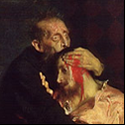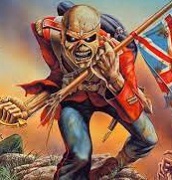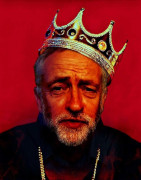|
Ferrosol posted:Yeah it's a very rare sequence of events. If I recall it's a number of low probability events that require Goering to threaten Portugal. Portugal to then complain to Germany. Germany to replace Goering and then Mittleafrika to choose the revolt against german rule option. All these events are the 10-15% AI chance options so it's very rare you'll see it. I've seen it happen once I think when I was playing Syndie France which made the war much easier for me. Thanks! You were 100% correct! If anyone's curious, here's what happens: Once Goering is out, you choose between Ernst Jünger, the German author, and Joseph Kasa-Vubu. If you choose the latter, you can then choose between aligning with the syndicalists, staying in the German sphere of influence, or isolationism. Regardless of your choice, the country is renamed Centroafrika. The flag is the red-black-green Pan-African flag with a red star in the middle of the middle (black) stripe. The HoS is Joseph Kasa-Vubu and the HoG is Patrice Lumumba. (Incidentally, the chief of the army is Mobutu, despite being six years old in 1936.) If anyone wants to play this through, start as Mittelafrika and enter event 55605 into the console. It's pretty cool that even after hundreds of hours of playing, Kaiserreich still manages to surprise with things I've never seen before!
|
|
|
|

|
| # ? Jun 9, 2024 09:50 |
|
Is it interestingly playable? Any events, cores or claims?
|
|
|
|
Looking through the events, staying as Syndicalist Centroafrica/Mittelafrica instead of becoming the Bantu Federation only has a special event to join the Internationale. Havent checked if the Bantu Federation gets anything special.
|
|
|
|
Loeb CL posted:Thanks! You were 100% correct! While we're on this subject, that exact event chain cropped up, incidentally, in a pretty good CSA AAR on the Paradox forums. They broke up into Bantu Federation, Benikongo, and Namibia. Most, I think, promptly joined the Internationale. I'll reiterate that the AAR is pretty well written, depicting the SACW as a messy, traumatic affair filled with bloodthirsty militias roving the country, not dissimilar to the Spanish Civil War OTL. Erwin the German fucked around with this message at 18:21 on Oct 27, 2016 |
|
|
|
CSM, we need you to update soon. Please.
|
|
|
|
Redeye Flight posted:CSM, we need you to update soon. I need it, too. Doing my best.
|
|
|
|
Redeye Flight posted:CSM, we need you to update soon. Was thinking the same thing. What did you guys do?
|
|
|
|
Time for a Kingfisher game!
|
|
|
|
Lustful Man Hugs posted:Was thinking the same thing. What did you guys do? Britain: "Brexit is the dumbest thing any country has voted for!" America: "Hold my drink..."
|
|
|
|
Chapter Twenty Four: Some Things Don’t Ever Change (Middle East: September 23 – November 28, 1943) Harry opened the Vanguard, greeted as always by its proud declaration that it was the LARGEST INDEPENDENT MILITARY NEWSPAPER IN THE WORLD. It wasn’t entirely independent, like the other newspapers published for military consumption, it had to be filtered through the Army apparatus, ostensibly for purposes of operational security. It appeared that the censors exhibited restraint with their power, though, as critical editorials were left alone. It was the thinking soldier’s paper, as opposed to the official outlets that served mainly as propaganda and diversion, trumpeting victories and honoring heroes across all the fronts. Harry didn’t begrudge the official paper’s readers, though. Everybody had different needs to keep it together, this far from home, this far into the war.  The cover story was a tough one to take. The Transcaucasian Socialist Republic, the bastard stepchild of the world revolution, long ignored by the syndicalist mainstream, had come into the fold.  The Vanguard had reported on rumors for months that the TCSR was engaging in nefarious schemes all over the Caucasus and Middle East. The way they told it, the TCSR was run by the lowest of the low. Rather than the noble syndicalists and anarchists who went to Paris, the Makhnos of the world, the TCSR was supposedly the haven for the dirt worst of the Russian Revolution. The Vanguard had always taken an anti-Totalist stance, so Harry wouldn’t be surprised if they were exaggerating, at least a little bit.  “Can you believe this, Joe?”  “Of course I can.” Harry read on. The double punch came later. American troops were rumored to be involved in what the Vanguard speculated was the TCSR’s price in the deal that was made. The takeover of Armenia and Azerbaijan. Harry was surprised that that made it through the censors.  “But why would they do this, Joe?”  “Because America, for all that it says, is a great power, and they’re gonna do what great powers do. They sold out the Caucasus so that the TCSR wouldn’t interfere in the Middle East. Deal with the devil. May be the best thing for the most people, could be horrible, I don’t know.”   “Isn’t it callous to make that kind of deal? Anti-revolutionary? Un-American?” This cracked Joe up. “Un-American? Have you ever read a history book? We’re talking about seven years of revolution and hundreds of brutalities. If you think that can all wash away in a few years, then you’re full of poo poo, Harry.”  “Joe, I think you’re wrong. I believe in the revolution.”   “I only believe in myself and the people who stood up for me. America has hosed me and my people forever, and now it tells us to believe in it. Go ask the Azerbaijanis what America’s word counts for.”  Harry was perturbed by Joe’s words. He couldn’t focus on the paper any longer. “I just- I don’t know.” “Listen, Harry. America is probably the most powerful nation to ever exist, except the Romans maybe, and I guarantee half of the people back home don’t give a goddamn about some people they’ve never met in some shithole caught up in our ‘revolution’. Some people have a voice, others don’t. A hundred thousand years of human brutality won’t be undone in a decade, the simple equation that the most vulnerable suffer the will of the powerful will not change. You’re not helping anybody if you believe otherwise. The revolution, Harry, is not over. It will never be over. It’s just that the enemy will be ourselves.”  “I think you’re wrong.” Joe stood to his feet with a start. “Then loving prove me wrong, Harry! Why should I believe they’d treat me any better than those poor Muslim bastards in Baku, if it was convenient for them? Do you think they’d let one goddamn black man in this army if Hoover hadn’t hosed up your lives? Just because you flipped a switch and realized what a mean world this is doesn’t mean the rest of us haven’t known it forever! If you want this loving country to do better, then get your head out of your rear end and make it do better!” Joe turned and left without another word, leaving Harry alone with his newspaper and his thoughts. Harry couldn’t help but think back a mere ten years, when the black folks lived in another neighborhood that was practically another planet. Harry, like so many others, had only recently bought into the idea that humanity was one large family, united through struggle. But the truth of the matter is that the alliance between the white and the black worker was truly forged in a time when the nascent socialist uprising was desperate to expand its reach beyond the most radical of Northeast and Midwest union halls. They had lent their arms to the fight, and more importantly, put their faith in the Combined Syndicates. Now, the world was being asked to put their faith into America. Harry was no longer sure if America deserved it.
|
|
|
|
Part of the hold up has been that I couldn't figure out a really good way to go through this specific part, because in the game I just kinda did it without much of a reason for it (through loading up as France and acceptall) other than it seemed appropriate. Not that I mind, it gives a certain kind of gray quality to the LP, but today was really not the day I wanted grayness. So, it's shorter and darker than I would have wanted, but that's fitting.
|
|
|
|
Chief Savage Man posted:Now, the world was being asked to put their faith into America. Harry was no longer sure if America deserved it. This is the feeling that I've been unsuccessfully trying to capture in words for about a day now. Was the Caucasus decision a fairly recent one, or just coincidentally timed?
|
|
|
|
gently caress.
|
|
|
|
tunapirate posted:This is the feeling that I've been unsuccessfully trying to capture in words for about a day now. Coincidence.
|
|
|
|
Btw, I'd like to add how great your balance of fiction and actual gameplay has been. After reading some LPs here on the forum and some, usually even worse on the Paradox ones, it feels less like it's an LP and more like it's fan fiction that occasionally mentions the game, something you avoid very nicely.
|
|
|
|
Deceitful Penguin posted:Btw, I'd like to add how great your balance of fiction and actual gameplay has been. After reading some LPs here on the forum and some, usually even worse on the Paradox ones, it feels less like it's an LP and more like it's fan fiction that occasionally mentions the game, something you avoid very nicely. If I tried to have the text to screenshot ratio some of those have, I'd be writing into the next century to get through all the screenshots I've got. :p A few things: 1. Japan is winning the vote with 39 to 33 votes for Australasia. I'll leave it open in case anybody has a change of heart. 2. I'm quite fortunate to be standing on the shoulders of giants in the sense that I'm writing based off a very well developed mod and universe. Other LPers like Rincewind are doing something I'd be too scared to do and going into modding their own alternate histories. I figure most people in this thread have probably read her LP, but if you have not, I recommend it, first of all, and second of all, encourage you to help her out with the modding workload. 3. While volunteering to help out, it occurred to me that I should actually play Hearts of Iron IV before attempting to work on a mod for it, so I finally got it and played it and boy, you guys were right, it's very good and I recommend it to anybody who doesn't have it. By the time I get through this entire story, I suspect KR for HoI4 will be going strong and I look forward to exploring that mod in a mini LP.
|
|
|
|
I'm really hoping for a playable beta of Kaiserreich for HOI4 sometime around Christmas, but I think that might be too optimistic.
|
|
|
|
|
I am literally waiting for KR before buying HOI4.
|
|
|
|
ZearothK posted:I am literally waiting for KR before buying HOI4. The vanilla is the best one yet and there are good mods abound. Aprés Moi Le Deluge is probably my second favorite alt history HoI mod after KR.
|
|
|
|
CSM just want to let you know that apparently Japan's events are a combination of broken and horrifically underdeveloped/incomplete. Iirc being an imperialistic land grabber is like the only path that has any depth/detail.
|
|
|
|
I was thinking that going through WW2 would be kinda lame so I didn't think I'd be way into HoI4 until mods were developed, but the focus stuff really makes it interesting with each major having different paths. I'm trying to be a more internationalist Trotskyite USSR right now but somehow suspect I'm gonna die. Fun game. And I do expect the Japan game if it stays that way to be way imperialistic because that's different than the isolationist one in this game. Asia has been sorta dull to be honest.
|
|
|
|
So who else is massively hyped for the HoI4 Kaiserreich launch? Also - who here is staying up late for it?
|
|
|
|
Lustful Man Hugs posted:So who else is massively hyped for the HoI4 Kaiserreich launch? Also - who here is staying up late for it? I've played some HoI4 and it's been literally years since I've played a non-KR DH game so it's actually odd playing historical nations and not KR ones. Hoping it turns out well and intrigued to see how it uses all the new features.
|
|
|
|
Lustful Man Hugs posted:So who else is massively hyped for the HoI4 Kaiserreich launch? Also - who here is staying up late for it? I am not losing sleep over it, but I might consider buying HoI4 when it's next on special after it comes out.
|
|
|
|
Hot drat the Russia Focus free is massive.
|
|
|
|
TheLovablePlutonis posted:Hot drat the Russia Focus free is massive. Yeah, Kaiserreich started as a Russia mod, and it really, really shows.
|
|
|
|
TheLovablePlutonis posted:Hot drat the Russia Focus free is massive. If only we had a history professor for every nation! It'd probably go poorly somehow. And yeah I'm kinda considering getting HOIV now that Kaiserreich's been released.
|
|
|
|
It's still a very rough beta though. Although to the developers credit they seem very quick to patch up any issues reported.
|
|
|
|
|
What is going on in Russia in this game?
|
|
|
|
Chapter Twenty Five: The Northern Front (Scandinavia: December 17, 1943 – February 26, 1944) Excerpt from unpublished memoir of David Parks, special investigator for the War Conspiracy Commission. Concerns an interview that took place in December 1952. The next interview would be the most interesting. Chicago was then, as it still is, a hotbed of demonstrations and political strife; the most political Americans tend to gravitate there whether they are motivated by civic duty or a rebellious streak, or both. No matter how much power is devolved down to states, cities or syndicates, some things will always be decided in Chicago, and those things are usually the most controversial. Unless you’re a total political animal who thrives on the conflict, it can be overwhelming. Go take a ride on any train or plane headed out of Chicago the day after a Chamber session closes and you’ll see just how exhausted most of the passengers are by it all. In 1952, given the heft of what the Chamber was considering, that tension was triple what it is today. That is why I was excited to get out. In eight months of hearings and investigations, I had been out of the city just once, and that was for a three-day trip to the reactor complex on Door Peninsula, all work, no leisure time. I was so desperate to change my surroundings that I volunteered to take the plane to Iraq to interview General Liffland, of Revolutionary Marine fame. Everybody was nervous about getting that close to a potential warzone, but I was more afraid of the dangers of overwork and stress than those that lurked across the Persian border.  The second my train departed, I breathed a sigh of relief and slouched down into my chair. It would be a long trip with plenty of opportunities for solitude and silence, one that started with a train ride to New York. Before the revolution, there was a train line known as the 20th Century Limited that would run from Chicago to New York in sixteen hours. The railroad was taken over by the military during the revolution, and it wasn’t until after the final peace that the constant materiel deliveries stopped. The railroads were then handed back to the unions, who had never really controlled them de facto in the first place, given the more than a decade of constant militarization. Air travel was becoming more and more popular by the end of 1952, but the 20th Century Limited, reinstated with the rather dull name of the Chicago-New York Express, offered a few advantages that air travel did not. Most of the delegates made full use of their priority boarding privileges that let them skip the often-lengthy waitlists for flights. Getting on the train with the regular folk let me escape the attention of any delegates who might be hostile to the investigations. I was also able, due to my credentials, to get a private compartment complete with a workspace that would let me go over my documents and get organized without any prying eyes looking out for their chance to get a hot scoop for the Proletarian. It was on this train ride that I gave myself a specific objective for this trip. The initial impulse to blame the British for everything had been washed away by the revisionist impulse to blame the Americans and French for not knowing how to deal with the British properly. The narrative went that the Americans and French acted arrogantly and foolishly with regards to the Union during the war. But as you remember from the last chapter, we found that the admirals never had a complaint about working with the Republican Navy and that the Central Committee seemed to get along just fine with Nicholas’ inner circle. Indeed, Thomas and Nicholas forged a strong working relationship over their mutual love of God while dealing with those who often rejected Him. In order to understand the direct and indirect role of the British in the conspiracies, we had to hunt down the source of the mistrust. And the earliest signs of it seemed to come during the Scandinavian Campaign.   The cooperation in the early stages seemed to go off without a hitch. The Republican Navy, depleted due to its vicious battles with the High Seas Fleet, was more than willing to use its extensive naval intelligence apparatus to support the operations of the newly ascendant Red Navy, which was eager to put its new carrier force to the test. The Red Navy could have likely dealt with the pitiful and obsolete Danish and Swedish fleets without the help, but the Republican Navy’s eagerness and humility in passing the torch to the Americans was hardly the signal of discord we were looking for.  This is what brought us to General Liffland. General Liffland was rumored to have a bad opinion of the British command, but of who specifically and for what reason wasn’t well known. The challenge would be to get Liffland to trust me. He had already flat out refused to come to Chicago, which is why I was headed out to him. He had a good excuse in that he didn’t want to be absent from Iraq in case of a Turkic sneak attack out of Persia, but the word from our sources in the military was that he had nothing but disdain for the investigation, believing it to be naught more than a show trial. From all of this context came my objective. I intended to establish trust with General Liffland and learn what, if anything, went badly between the American and British commands during the Scandinavian campaign. Anything else beyond that would be a bonus.  My preparations both helped me to relax yet paradoxically also make me more tense. Knowing what I knew about his attitude made me not look forward to the questioning. On the other hand, expecting obstinacy meant that I could not be surprised by it, and so I found some solace in the idea that I at least knew what I was getting myself into. Indeed, many of the Marines I would meet had been with Liffland’s unit when it landed in Denmark nine years prior. They had also taken part in most of the later events which our commission was now investigating as potentially criminal in their conception. We always made pains not to tar the individual soldiers with broad strokes, but even being accused of performing honest service in pursuit of dishonest ends could be taken as an affront by veterans, and I couldn’t blame them for that.  By the time I made it to New York and boarded my plane to Paris, I felt prepared for what was to come. There were some telegrams with new developments waiting for me, but nothing really relevant to my objective. It was a long flight and poring over my documents wasn’t going to lead me anywhere else, so I decided to take some time to appreciate my first transatlantic flight. The ocean sprawled as far as the eye could see, and I was equal parts anxious and excited. If we went down here, at this time of year, it’d be an icy end for all of us. My anxiety was allayed somewhat when they introduced our pilots to us. I can’t for the life of me remember their names, but I do remember that one was a former fighter pilot and the other flew naval bombers. Their military experience gave me some peace of mind, as well as an idea. If they were old enough to have flown in the European theater, then there was a strong chance they had participated in the Scandinavian Campaign.  Seizing the entrance to the Baltic Sea required complete naval control of the waters around Denmark, which was difficult to achieve with the High Seas Fleet sheltered in Kiel. Even the small Danish fleet could wreak havoc on an American landing force if it was able to approach them mid-landing. With that threat in mind, American bombers often raided Copenhagen harbor looking for enemy ships to destroy.  Back in the fifties and sixties, you could talk with the pilots if they saw good reason to let you in the cockpit. I could have pulled my credentials on them but I decided on the subtler route. I know that it’s a hell of a rotten thing to do to pose as a veteran when you’re not, but I had learned enough about the war that I felt like I could get away with it. And so, I was able to chat up the pilots for a few hours.  To my delight, both had seen action near Denmark. The fighter pilot had flown as an escort for the bomber pilot, which was how they became friends. They were doing the clever routine when two good pals speak to each other’s exploits so as not to seem like braggarts but still come off like genuine heroes, which they were. “This man here, he shot down four Swedes in one day! Saved my behind, I tell ya!” “Ah it was nothing; this guy here evaded them like a champion prizefighter. Any lesser pilot woulda gotten shot down in no time.” If you’ve ever had the privilege of listening to veterans spin war stories, you can probably imagine right now the type of conversation that was going on in the cockpit. I let them go on and on, not only to avoid disrespecting them or coming off as prying for changing the subject, but also because it was a long flight and this passed the time. I didn’t offer up much in the way of my own stories, insisting my service was boring compared to their exploits. I was younger, so I could get away with saying that I had enlisted just in time to see the last bit of action. The less I had to lie, the less opportunities I had to make myself look like a fool. Finally though, I thought of a way to get closer to what I wanted. “I bet you impressed the hell out of the dames back in England with these stories.” “Oh no, we were flying out of Germany when the Swedes ambushed us. The fighters couldn’t make it all that way to Denmark from England and leave us with enough time to do our work.” “And besides, those German girls didn’t care for us anyway.” “Because we bombed their houses?” “They made us do it! I didn’t want to be there!” This made me smile, half out of amusement and half out of pride that I had managed to get an important detail without slamming my credentials over their heads like a cudgel. We had had a hard time establishing where the airplanes involved in the operation were based. I suspected Germany but England wasn’t out of the question. Until a pilot of the operation helped me establish they were not. I was one for one on this trip. Any detail I could get without butting heads with the stone-wallers in the military felt like a coup. While I basked in my small victory, I let their banter roll on. I had forgotten to pack any books and the thought of poring over my documents again made me sick. While the pilots couldn’t help me further with my investigation, they sure could help me pass the time.  After disembarking in Paris, I boarded yet another plane to Istanbul. This plane was almost empty, and the handful of passengers showed no interest in speaking to me, either because they could not speak English or the daily torrent of scandal coming out of Chicago had soured them on Americans. This was my opportunity to prepare my approach for the interview. The last leg of the trip was on a military plane, and I had no idea if it would be the kind of plane I could sit and peruse my materials in. With how much the military resented our investigation, I was half expecting to take the trip from Istanbul to Baghdad in a Great War biplane, or maybe a camel caravan. When I arrived, I was probably going to be brought right to the General without any time to prepare or even relax. I charted the course of events for the final time. First, Liffland had landed in Denmark, then a few weeks later, Cates landed in Narvik, seizing an important naval base from the enemy.  Meeting no resistance, General Cates followed the protocol set for him by General Marshall. Labor camps in the north that held jailed trade union leaders were liberated, and the handful of exiles that accompanied Cates during the landing began to establish a provisional government. Confident that he could make the next move before the Pact could react to his first, Cates proceeded to prepare for another landing to the south, near Trondheim. This would take less time than the overland trek, and demoralize the enemy further.  After yet another unopposed landing, Cates elected to proceed into Sweden. The idea was that after securing Värmland, he could either turn westwards to advance on Oslo, eastwards to advance on Stockholm, or southwards to secure Malmo.  While this was going on, there was a parallel operation led by Liffland, which aimed to neutralize the German High Seas Fleet once and for all. Air raids could only accomplish so much.  While Cates seized town after town in Scandinavia with no resistance, Liffland and the Marines engaged in one of the most famous operations of the Northern Front: the Kiel Raid.  The sudden appearance of the Marines in Denmark in the dead of winter was a shock to the German High Command, and with the Communal Army barreling in from the west, there was no time to reinforce the critical port.  What happened next was unexpected by everybody, and the reason why I was bothering with any of this in the first place. The American operation to crack open the north of Europe had two objectives: the first was seizing the poorly defended Scandinavian monarchies, whose armies were helpless to save their homeland, since they were busy being run over by French armor in Germany; the second was to put an end to German naval power once and for all. There was a worry that the German High Seas Fleet might attempt to break out of the Anglo-American blockade and attempt to act in concert with the Entente fleets in the Pacific. Going after the fleet at its home would put an end to that risk. Every American officer proceeded with the understanding that the British had elected not to participate in the Norwegian landings. So imagine the shock when four British divisions landed in Oslo.  This would not have been much of a problem, except that the British Army then proclaimed the legitimate socialist government of Norway would be the one they had just set up in Oslo, something that the Americans did not know was going to happen. This incident marked the first major public breach in the Anglo-American relationship, even if resentment had been brewing under the surface (about perceived British inaction on one hand, and about America supplanting Britain as the second most important member of the Internationale on the other).  The reaction from Chicago was swift and shocking. I was still a teenage boy when it happened. Amidst the daily reports of victory after victory, the news surrounding the Norway dispute provided the controversy that the independent press searched for but couldn’t find in the sanitized war news that made it through military censors. Two allies, two different Norwegian governments, and after a few days, a meek statement from the British government that said, in so many words, that their people in Oslo had only intended to establish government over the city, not the entire country. It was the kind of convenient fiction that Qingologists would describe as ‘face-saving’ and nobody believed it for a second.  As Cates moved on into Sweden, the American high command at the time must have thought that the entire episode was behind them. It was in everybody’s best interest to forget the whole thing had happened, and get on with the more pleasant task of final victory. Nine years later, the Commission was digging it up again. My plane to Iraq turned out to be more comfortable than I expected, even though the ride itself was boring. I had no space to work in, and nobody showed any interest in speaking to me. Even though it was broad daylight, I eventually fell asleep to the droning sound of the plane’s propellers. I awoke to a different sound, a loud buzz that sounded like no plane I had ever heard. Looking out the window, I saw the strangest looking plane I had ever seen. It had no propellers, and its wings were swept back like those of a diving bird. It was a jet fighter, which at the time were only deployed in the areas most likely to see combat, which is why wartime propeller planes were usually the ones we saw flying around at home. I looked out the window on the other side and saw another one. They were here to escort the plane to its destination. I didn’t think much more of it until we landed. The jets peeled off as our plane began its descent. I didn’t see where they were headed, but I imagine it was probably to the east, to keep a watchful eye on the Persian border. This was the outermost frontier of the revolution. To the west: the socialist world. To the east: a Central Asian empire that would have made Tamerlane proud. It had been over 15 years since there were battles fought in Chicago, and I think Liffland was more than happy to remind me that just because Chicago had been peaceful for that long did not mean every corner of the free world could feel as safe. We landed, and four armed Marines were waiting for me, brandishing new-fangled weapons I recognize today as assault rifles, another invention I had never seen up to that point. The most modern weaponry was present here: huge tanks, arrays of rocket artillery, jet fighters, all of which probably seem quaint to modern readers but represented the cutting edge at the time. The Marines escorted me into the base and into an office where I found General Liffland waiting for me. “Comrade Parks.” “Comrade Liffland.” General Liffland moved his glasses up his nose as he looked up from his desk. He had the aura of a leader, and even if I had known nothing of his exploits, I still would have been compelled to remain silent and await my orders. “Now, Comrade, I would like to get this over with as soon as possible. I will allow you to tell me what you’re looking for, and then I will tell you if I can give it to you.” I took a deep breath. He had laid out the parameters quite concisely, and if he didn’t like what I had for him, he would have me dragged back onto the plane and sent back to Istanbul. At that point, we’d have to make an official request to recall him to Chicago if we wanted to compel him to testify. That would be messy, to say the least. It was at this moment that I didn’t feel quite so lucky to not be in Chicago. “Comrade, our investigation has progressed to such a point that we are almost certain no Americans knew of the British intent to d-“ “Obviously not.” The interruption jarred me a little, but I took a deep breath and continued on. “It is our current objective to learn why there was such a breakdown between British and American commands, because even if there is no direct culpability on the part of any American officer, there is still the question of whether any Americans acted in an inappropriate way.” “Inappropriate in what regard?” “Not criminal, but rather reckless or arrogant. What we’re looking to answer is: Did any American decision makers act in such a way that the British were unnecessarily alienated?” After a brief pause, I continued. “It is not our intention to charge anybody in relation to this matter. Instead the Chamber has charged us to investigate so that we may better understand why it happened. It is not a matter of blame to be assigned but rather lessons to be learned.” Liffland’s contemptuous glare softened somewhat. I was telling a bit of a lie, there were certainly many delegates eager to assign blame, but if I gave the impression that we were seeking to bring up charges against an American for British actions, Liffland was likely to regard it as a show trial and send me home without what I came for. “I see. So what is it you want from me?”  I had my foot in the door. It was time to press for what I wanted, but to make sure not to be accusatory. “The earliest signs of discord that we have found thus far is the incident in Norway during the war.” “I was never in Norway.” “Yes, I’m aware. However, you were involved in the planning of the overall Scandinavian campaign, and if I may make a presumption, I assume your distaste for the British must have began there.” Liffland sat up in his seat and drew a deep breath. “Okay, I get it, I see what you’re after. It had to do with the Kiel Raid.” “The Kiel Raid? That was a resounding success, I always thought. Did something go wrong?”  “Alright, do me a favor and shut up for a minute, Parks. I’ll break it down for you. First things first, you are wasting your time if you are just considering the ‘British’. You have to think about the Republican Navy and the Republican Army. The Navy were always helpful, they helped us every step of the way. Our bombers were guided by their intelligence, for instance.”  Success. Liffland was talking, and I could tell by his tone and candor that he took my assurances at face value. I was silent as he asked and furiously jotted down every last word. “Every island, inlet and port in the North Sea they had mapped out. They tracked every last enemy ship the best they could, from the Graf Zeppelin to the oldest Danish submarine.”  “It was because of them that the Raid was successful. The entire operation hinged on their intelligence, that Wilhelmshaven was a staging ground for a breakout attempt in case Kiel was lost, which is why we knew where to base our fleets. The submarines tracked them down and the surface fleet finished the job.”  “I’m sure you’ve seen the footage: it was a phenomenal success. Our carriers slaughtered them.”  I had indeed seen the footage. The Battle of Heligoland was the greatest naval victory in American history up to that point. The Graf Zeppelin put up a heroic resistance, but it stood no chance against wave after wave of American dive bombers. Once the carrier went down, it was open season on German battleships. Ten would go down in the space of thirty six hours. No American ships were lost, as no American ship was ever even in range of German guns. The age of the carrier had indeed dawned.   The German High Seas Fleet had lost a number of capital ships, but the Syndintern refused to lay up. The rest of the Fleet that made it to Wilhelmshaven was bombed round the clock by every bomber the Americans could muster, probably including my pilot friend who had flown me across the Atlantic, not to mention by the carrier fleet.  The Germans endeavored to protect their remaining capital ships, and in the first few days the raiding bombers went after smaller ships, probing the air defenses around Wilhelmshaven, which had been beefed up since the first raid months prior.  Destroyers and cruisers went down one after the other. American bomber pilots would end up nicknaming Wilhelmshaven “The Fish Barrel”.  Another image that I remember to this day is the newsreel footage of the Boelcke exploding in harbor. The Germans were considering a counterraid, having no idea of the true size of the American fleet trapping them in port. The Boelcke, already in rough shape from a few near misses and hits by smaller bombs, was loaded up and prepared to leave port to attempt to strike back and perhaps cover for a mass exodus to Australasia. The intended target was the Commune of Paris but instead the Boelcke never even made it out of port. The next raid approached undetected, as German radar stations had been blown to bits, and the Boelcke was slammed by torpedo bombers. The classic footage that still sees use in shows about the war was then captured. A high-altitude bomber filming the chaos below captured two American torpedo bombers making a run, then two long streaks as the torpedoes streaked towards the Boelcke. The first torpedo hit and exploded, but the second one hit the area where bombs were stored. The explosion was enormous, and when the smoke cleared, the Boelcke had been blown into two pieces. Both ends sank as airplanes and crew slid off the slanted decks into the waters below.  “Yes, yes, I remember that. If it was such a success, why was there an issue with the British?” “Well, we were planning on opening up Kiel with the help of the Republican Navy, which we did. But there was a second part, and we wanted the help of the Republican Army for that.” “And you didn’t get it.” “Correct. After the Raid, I took the Marines back north. We needed Copenhagen.”  Now we were getting somewhere. He was staring at the ceiling and at some point had ended up with a drink. He was in full story mode, and that was what I needed. “The Danish couldn’t defend Copenhagen whatsoever. They were woefully unprepared.”  “But there was a problem. We couldn’t get across the straits. We needed the Danish Navy totally destroyed in order to make it across. So we sent in the planes.”  “With my Marines coming in from the west, and Cates coming in from the Swedish side, we figured it was just a matter of time, and course it ended up being a matter of time, but things got more complicated, and for no good reason.” “Because of the Republican Army?” “Exactly.”  Liffland set down his drink and sat back up in his seat. “Those motherfuckers never lifted a finger to help us. We asked for them to come in and hold the mainland until we put the Danes away. And they did not do a loving thing while the Germans sneaked in a division behind us.”  “I don’t remember hearing about that?” “It didn’t turn into a huge problem because the Germans were undersupplied and outmatched. We forced our way back onto the mainland, and it ended up being fine. But some of my people died because of that. People who didn’t need to, all because Lawrence wanted to play a loving game.” My ears perked up. “Lawrence?” “Yeah, Lawrence.” Liffland fell silent, as if considering his next words carefully. I was close. “Listen, I don’t know this for sure, so don’t quote me on it, but that rat bastard Lawrence wanted us to fail. I think he held those troops back, just like he sent them into Oslo when he was told not to.” “Who told him not to?” “Everybody in London, as far as I can tell. But the British, see… The problem with the British, they didn’t know when to work together. The Navy and the Army had no idea what the other was up to. See, when Marshall told the Red Army to jump, they asked how high. When he told the Red Navy to swim, they asked which stroke. There was no Marshall in Britain, just a loving mess. That’s why the Navy broke its own back keeping the sealanes open for us, and that’s why we had to land on seventeen different shores ourselves because the Republican Army did nothing that it didn’t absolutely have to, because there was nobody that could make them.” 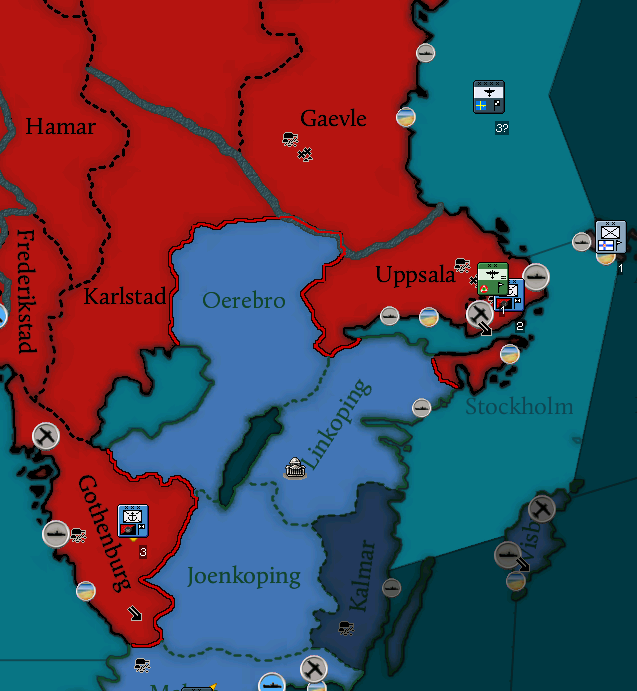 “So that made you angry?” “Of course it did! The Republican Army resented us ever since Torch, because that’s when we became France’s best pals. They wanted us to fail. That northern front should have been open long before we did it, but instead they invaded goddamn Mallorca, like anybody gives a poo poo about Mallorca. They never wanted to help us because they were only in it for themselves. Once American blood was shed in Scandinavia, they knew that Scandinavia was going to be in our corner after the war, just like the Middle East, just like Africa. That’s why they tried the stunt in Oslo, to try and get what they believed they were owed, which was post war influence in Scandinavia. Of course, the second our troops landed, there was no shot that Scandinavia wasn’t going to be under our umbrella. That’s why Gitlow put his foot down and forced the British to retract. The Republican Army was looking for some power and glory, and they hadn’t earned any, and no chance we were going to let them steal ours.” “I had never heard that they were supposed to send divisions.” “No, because Marshall and Gitlow didn’t want another scene after Oslo. The whole thing was suppressed and forgotten about.”  “We had gotten Sweden by that point, and everything was so close to over, so I don’t blame them for that.”   I was still writing down all of this information when Liffland piped up again. “Remember that Denmark was neutral. They never joined the Pact until the British attacked their shipping and declared war. Again, I don’t know this but I’m sure the British had their eyes on the Baltic. If the Mediterranean was to be America’s domain, then they wanted the Baltic.” 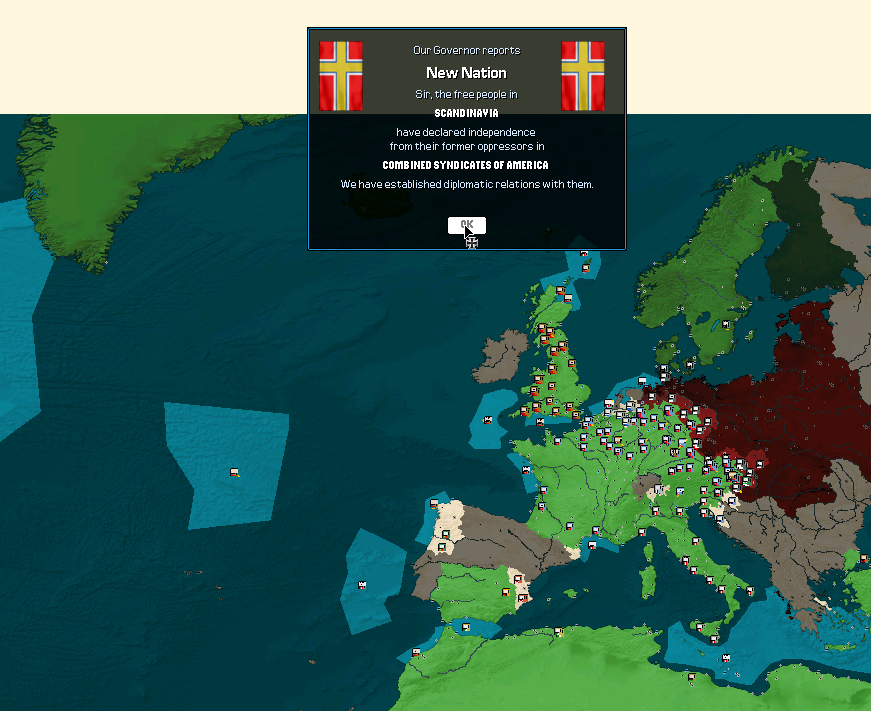 I had put the dots together by this point. “So they were upset that Scandinavia was put together without their involvement?” “Yep. Absolutely. Not that I feel the slightest bit of sympathy for them. They could have done it themselves at any time and I’d be the first to congratulate them. 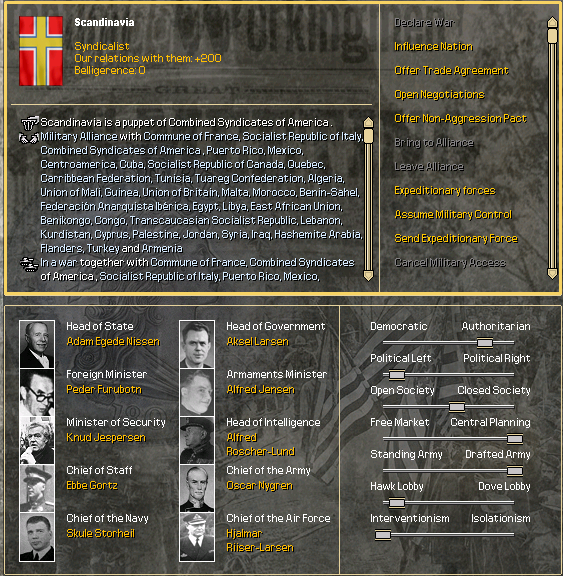 He was onto something, for sure. Scandinavia had become one of the most pro-American voices in the European Union in the past few years, second perhaps only to Italy. Britain, by contrast, had almost no friends in the Union.  “Thank you, Comrade Liffland.” Liffland looked up at me, all the earlier contempt gone from his eyes. “One more thing, Parks. I know it’s been a while but I’m sure you remember what the Commission was formed to investigate, even if you’re here asking me about Scandinavia of all the drat things in the world.” “Well yes, of course I remember.” “Well, I’ll tell you that you’re onto something asking me about all this, but believe me the takeaway from Scandinavia isn’t that our working relationship deteriorated. Just think that Britain had, over and over, been shown up by the Americans. The Americans landed in Africa, the Americans put an end to the Ottomans, the Americans took over Rome and crossed the Alps. But that was all to the south. In Scandinavia, we went right into their neighborhood and did their job for them. We threw the Germans out of port, and it was our Navy who had the final triumphant victory, and not theirs.” “What are you getting at, Comrade?” “America had clearly supplanted them, and they must have felt like they were in danger of being rendered irrelevant. So eventually, they resorted to the one thing that would force the world, socialists and capitalists alike, to recognize their power. So maybe this wouldn’t have happened if we had tried harder to include them, but that’s the benefit of hindsight. And really, they were such a mess that we had to do what we did. But if we had known what could have happened, I guess maybe we’d have thought differently than we did.” “I see.” “I’m not sure you do, but that’s not my problem. Go home, Comrade, and tell your Commission the truth about the whole thing.” I stood up and shook his hand and turned to leave, but then paused. “Comrade Liffland, out of curiosity, what would you say to the Commission in my shoes?” Liffland said nothing for a few seconds, thinking about it.” “I’d tell them that both America and Britain hosed some things up and a lot of things happened because of it that many of us regret.” “Then that’s what I’ll tell them, Comrade Liffland.” I walked to the door and opened it. “And also that we did our best.” I looked back at Liffland after he said that, and watched him pour himself another drink. He clearly had some memories he needed to be alone with. “And the world appreciates it, even if it doesn’t always seem that way. Good bye, Comrade.” I closed the door behind me and walked over to the Marines. “Comrade Parks, the General has authorized us to offer you use of our facilities if you’d like to eat and take a shower.” “Please thank him for me, but I must decline. I should get back to Istanbul as soon as possible.” “Very well, Comrade. Please follow me.” I had gotten everything I needed from Liffland, and the trek had been worthwhile, but now my mind was racing, and the sooner I could get back to Chicago the better. I suspected that Liffland’s supposition about the British was entirely correct, and proceeding with that paradigm would bring our investigation into its most fruitful period.
|
|
|
|
blood simple posted:What is going on in Russia in this game? Nothing for a while now. I'm not exactly sure what their government is at this point in the game but I do note some government changes for them in the future. I want to say they're either a social conservative or authoritarian democrat alignment but I'm not sure. Do recall that Siberia successfully broke off, but they are neutral in terms of the war, seeing as they have multiple reasons to hate everybody involved and had another bloody civil war. I am going to close the Japan or Australasia poll at some point soon because Act Three is almost over and I'd like to start exploring the options for whoever wins so I can plan out good spots for audience voting. Japan is winning by 5 votes as of now, so if you're a weeaboo and had a change of heart, now is your opportunity. e: also the last one was pretty tough to come up with something I liked in addition to holiday time being busy, I have more ideas for the next few so it definitely should not be two months before the next update. csm141 fucked around with this message at 02:45 on Jan 15, 2017 |
|
|
|
This LP never fails to reinvigorate my love of Kaiserreich. Hoping the next update is the fall of Berlin!
|
|
|
|
So, uh. What... did Britain do? I'm imagining it has something to do with nukes tbh.
|
|
|
|
GunnerJ posted:So, uh. What... did Britain do? I'm imagining it has something to do with nukes tbh. Brexit.
|
|
|
|
That loving Denmark strait bug, oh how we have beaten our heads against that trying to find a workaround. I hope whoever made straits in DH hardcoded steps on legos every day for the rest of his life.Chief Savage Man posted:Brexit. They dropped out of the International? Please tell me it does nothing but gently caress their economy and make the Americans even more powerful So the end's in sight in Europe, which means it's time to plan our return to Hawaii, right?
|
|
|
|
Man, this LP is such a ray of sunshine in a world of liberalism. I almost wanna print it out and make it into a book or something.
|
|
|
Deceitful Penguin posted:Man, this LP is such a ray of sunshine in a world of liberalism. I almost wanna print it out and make it into a book or something. I was sorta expecting a post to coincide with Cheeto Mussolini's inauguration. This LP is truly amazing.
|
|
|
|
|
Chief Savage Man posted:Brexit. Probably should have seen that coming!  I was going off of this line: "Comrade, our investigation has progressed to such a point that we are almost certain no Americans knew of the British intent to d-" And I had figured the "d-" might be the start of "destroy" but I guess I could be "depart."
|
|
|
|
GunnerJ posted:Probably should have seen that coming! Destabilise?
|
|
|
|

|
| # ? Jun 9, 2024 09:50 |
|
Stay tuned!
|
|
|



